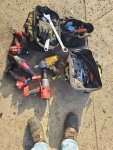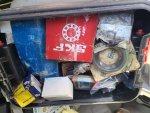- 39
- 52
- 18
- Location
- NM
We bought our 2003 LMTV in the early summer, and it's been on the side of the road twice since then. I know some bugs always have to be worked out, but these failures have made us think about the use of this truck going forward. We used to take our M35A2 into the forest to get firewood, and never had any problems with it. We probably should have considered more what would happen if we had mechanical failure while we were out, but we didn't. With this truck, it is ever on our minds. The local tow companies don't seem to be able to help due to the size of the LMTV and the locations we are discussing (forest roads). Many of their trucks are similar weight and are not 4x4s. I am wondering, for those of you that use your FMTV (or any big truck for that matter) for off-road or overland use, what is your game plan for getting out of the wild in the event of mechanical failure? It seems a bit overkill to buy a 5-ton wrecker just to pull my 2.5 ton out if ever it is needed. Or is that what you guys do? We don't currently have any friends that own one. Thanks.




